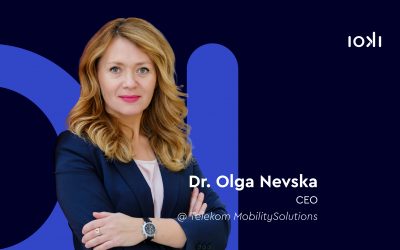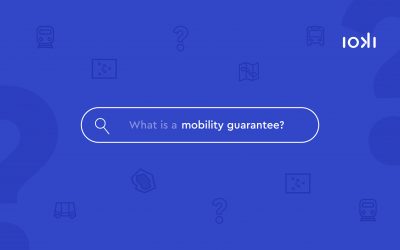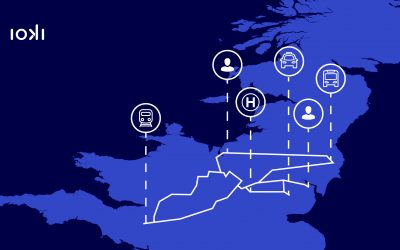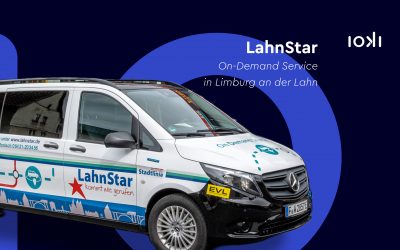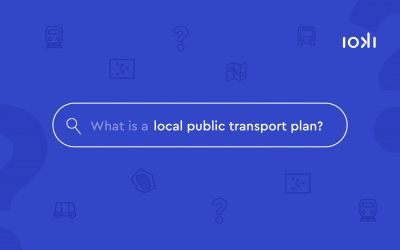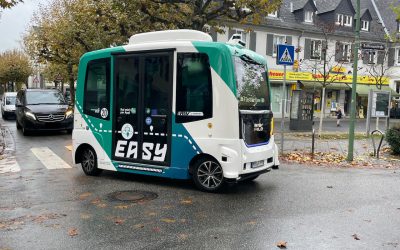RE:PERSPECTIVES from Dr Olga Nevska, Telekom MobilitySolutions
Three years ago, Dr Olga Nevska, CEO Telekom Mobility Solutions, was interviewed in our blog series “PERSPECTIVES from …”. At that time, we talked about the challenges of organising company mobility solutions, but also about employee mobility at Telekom and the then new on-demand service with ioki software.
Since 2020, a lot has happened in the area of mobility and work. That’s why ioki insights asked again. This time, it’s all about the changes in employee mobility since the pandemic, the trends in corporate mobility and how demand responsive services are being received by employees.
Corporate Mobility in 2023: flexible solutions instead of classic company transport or company cars
For a long time, the company car was considered the non-plus-ultra and was often the only mobility offer employees could expect from their employer. In 2023, more flexible mobility solutions such as digital demand-responsive company transport, job bikes and mobility budgets are gaining ground. Rising energy prices, stricter environmental and climate protection regulations as well as greater sustainability awareness among employees are also contributing to the need for companies to rethink their corporate mobility management.
See and be seen – Joint event of ioki and Women in Mobility Frankfurt
Under the motto “See and be seen”, the first joint #MoveUp event of Women in Mobility and ioki took place on Wednesday, February 8th, 2023. Around 50 participants, women and men, from the mobility industry in and around Frankfurt took the opportunity to exchange their experiences and views on the topic of visibility in a relaxed atmosphere.
PERSPECTIVES from Laura Reupke
As Head of Sales International and Business Development, Laura Reupke is responsible for the international business development of ioki. With her extensive experience in the transport and digitalisation sector, she is developing customer-oriented solutions for a needs-based transport transition in Europe together with her international team.
What is… a mobility guarantee?
A mobility guarantee is
Planning mobility for rural areas: What about public transport in England, Wales and Scotland?
55 million German citizens living in suburban and rural areas do not have access to attractive public transport offerings. This was the result of our mobility analysis of public transport in Ger-many. But what about public transport in England, Wales and Scotland? Our transport planners investigated this question. Around 450,000 weekday trips from timetables of over 300,000 stops in England, Wales and Scotland were analysed. The result: in all three parts of the country (except London), less than 20 per cent of the population have access to attractive public transport.
Mobility Turn, now! Mobility of the Future in Baden-Wuerttemberg
In the previous edition of “Mobility Turn, now!” we looked at the measures taken by the state of Hesse to enable citizens to travel in a climate-friendly way by local transport. This time we are taking a closer look at Baden-Wuerttemberg.
PERSPECTIVES from LahnStar Limburg
Since 2015, a dial a ride service (call-collective-taxi or in German Anruf-Sammel-Taxi, AST) has supplemented public transport in Limburg, Hesse. In 2021, the AST was digitalised by an on-demand service called LahnStar. ioki insights spoke to Michael Stanke, first councillor of the city of Limburg and operations manager of the Limburg city line, and Hicham Azzou, head of the public transport department, about the development of the AST into on-demand mobility. The LahnStar is part of the OnDeMo project of the Rhein-Main-Verkehrsbund (RMV).
What is… a local public transport plan?
A local public transport plan is a planning instrument in which all performance and quality criteria for the operation of local public transport in an area are acquired. The local transport plan analyses the existing mobility offer and serves as a guideline for the future development of local mobility.
Easy through the Mobility Turn: Autonomous On-Demand Traffic in the Rhine-Main Region
The mobility turn cannot be achieved without digital and forward-looking mobility offers. The goal “more mobility with less traffic” can only be realized by the merging of different digital technologies. One key element in this effort can be autonomous vehicles on demand.
PERSPECTIVES from Dr. Dirk Rothenstein
Since 2021 the urban railway, called S-Bahn in German, in Stuttgart relies on a flexible rail replacement bus system operating on demand whenever modernisation work is undertaken on the main line. This is possible with on demand software powered and developed by ioki. ioki insights talked to Dr. Dirk Rothenstein, who is the chairman of the S-Bahn Stuttgart management board, about modernising the rail infrastructure, multimodal mobility in the city and the rail replacement services on demand.
Mobility Turn, now! Mobility of the Future in Hessen
65 million tons less CO2 emissions till 2030 – this is the climate goal for the German transportation industry. More electric mobility, a modernized rail network and billions for the development of public transport are supposed to contribute to the effort of Germany becoming more climate friendly.
But which measures are being taken on a federal level to enable citizens to be sustainably mobile with less ecologically harmful traffic? What progress is being made in the efforts to expand public transport, to reactivate old train tracks and to install new bike lanes? We answer these and other questions in our new blog series “Mobility turn, now!”. We want to show pioneering mobility projects in each federal state as an example for a successful and sustainable mobility turn in Germany.

